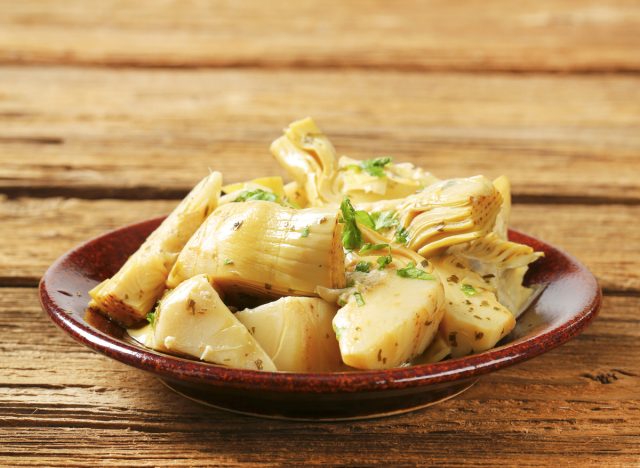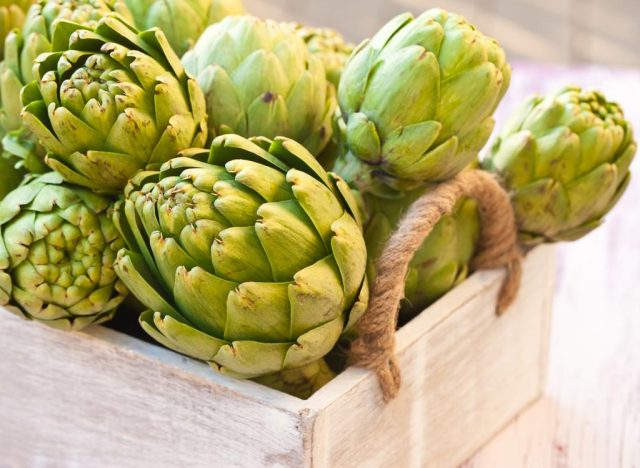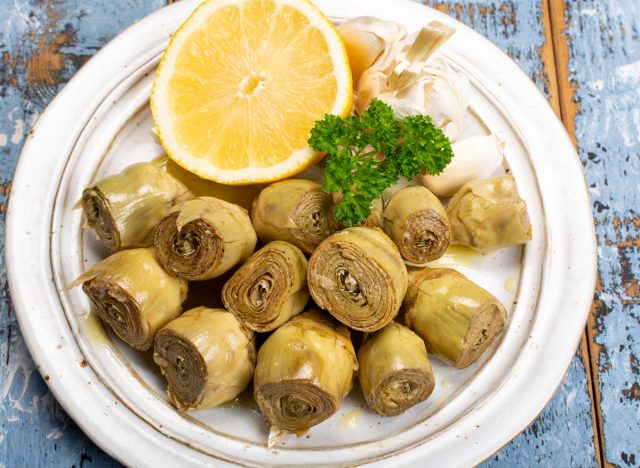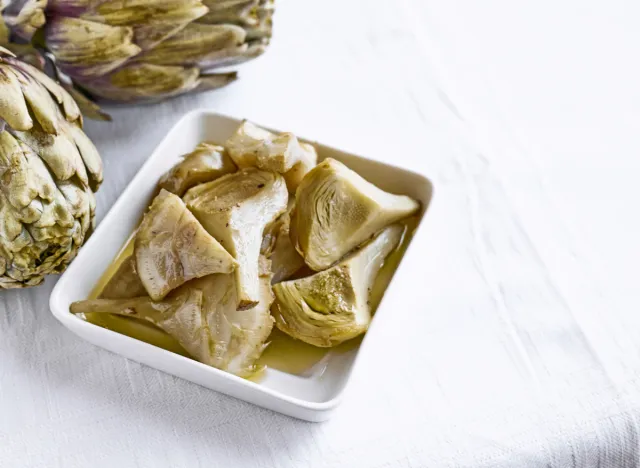Some might say artichokes are one of the most underrated vegetables; while they may not get as much notoriety as other green veggies like kale, broccoli, and Brussel sprouts, they’re just as tasty, nutritious, and versatile to cook with. Whether you steam, roast, braise, or grill them, their soft, creamy, nutty-tasting flesh is unlike anything you’ve ever tasted. As a bonus, they happen to be pretty good for you, too.
“Artichokes are a great addition to any diet because they are high in important nutrients like folate, vitamin C, and vitamin K,” says registered dietitian nutritionist Melissa Groves Azzaro, RDN, LD. “They are also one of the highest vegetable sources of fiber.”
According to registered dietitian Kelly Springer, MS, RD, artichokes are not only high in nutrients but also low in calories—making them a true superfood. Plus, Samantha Schleiger, MS, RDN, registered dietitian and owner of Simply Nourished LLC, says artichoke flower heads actually have the highest antioxidant activity of any vegetable.
So, what health effects can you expect when eating this unique little vegetable? Here are four common effects to be aware of, according to registered dietitians.


Looking to protect your heart? You may want to grab an artichoke bulb. A 2020 study published in The International Journal of Environmental Research and Public Health found that populations with higher artichoke consumption had lower rates of cardiovascular mortality, suggesting that this particular vegetable may have a cardioprotective effect; however, this observational study only proves correlation and not causation.
According to Sara Chatfield, RD, a nutrition specialist at Health Canal, this cardioprotective effect may stem from artichokes’ ability to help lower cholesterol—specifically, “bad” LDL cholesterol levels. Chatfield notes that this vegetable may also improve other risk factors for heart disease, like hypertension and triglyceride levels.
“More research is needed on specifically how artichokes promote heart health, but their prebiotic fructooligosaccharides are thought to contribute to their cholesterol-lowering effects, and the antioxidant compounds present may also contribute to these health effects,” Chatfield explains.


“Artichokes have long been known to have benefits for the liver,” says Azzaro. “They contain a compound called silymarin that may help increase bile flow in the liver, which helps your body metabolize hormones and toxins while protecting the liver from damage.”
READ RELATED: 6 Best Drinks To Lose Belly Fat and Slow Aging
A 2021 study in Nutrients found that the chlorogenic acid present in artichokes can protect liver cells, as well as repair damaged cartilage around your joints.


One artichoke contains 6.84 grams of fiber, which is one-quarter of the daily recommended value for adults. And fiber is important for digestive health because it helps to bulk up and soften the stool, making it easier to pass (and thus preventing constipation).
“Artichokes contain a mix of beneficial fibers including insoluble fiber for digestion and soluble fibers such as inulin, which can help lower blood sugar and cholesterol,” says Azzaro. “Inulin is also a prebiotic, which means it feeds the good bacteria in your gut.”


Chronic inflammation has been linked to a multitude of chronic diseases, and Juliana Tamayo, RD, an editor for FitnessClone.com, says artichokes contain a slew of antioxidants like rutin, quercetin, silymarin, and gallic acid that help keep inflammation at bay.
“These can help prevent cellular damage, lower inflammation, and reduce your risk for chronic illness,” Tamayo adds.
Kiran Campbell, RD notes that one particular flavanoid in artichokes, luteolin, can reduce chronic inflammation and inhibit the production of cholesterol, helping those with arthritis and hypercholesterolemia.


While most side effects of eating artichokes are positive, there may be one downside; Chatfield notes that artichokes may cause digestive trouble for some people due to their relatively high fiber content.
“Unfortunately, people with irritable bowel syndrome may have trouble tolerating artichoke hearts because they are high in fructans, a FODMAP (fermentable oligosaccharides, disaccharides, monosaccharides, and polyols) that is not well digested,” she explains. “This can lead to digestive symptoms like gas, bloating, and diarrhea or constipation in those who are sensitive.”
Source:











